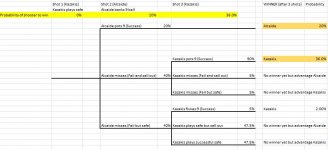Here is a simple event tree illustrating the rough (not exact) theoretical probabilities. Would agree with sjm that Alcaide making the long bank is more like 20% in this super high pressure final rack. Kazakis chances of winning is not 80% if Alcaide misses, it is a % of 80%. If we assumed that when shooter misses , % of sell out and % safe is equal, then Kazakis winning is a high % of the Alcaide sell out. i.e. roughly 90% x 40%=36%
So basically, Kazakis takes a gamble and sacrifices opportunity to win in exchange for Alcaide to giving him better chance (36%) in event Alcaide since Alcaide only has 20% chance of making the bank. So is Kazakis chances of going for that bank better than 36% ? Maybe In practice or non-pressure situation, Kazakis or other top players would made that bank 40% or 50% or 60% of time. But Kazakis mental state and confidence level at that moment suggests he needed to sit down so chances of him making the bank then would be lower than 36% maybe close to 0% ? Ducking would have been the right decision for Kazakis at that moment. Of cos, other top experienced players with better mental game in his position would have gone for the bank and that would be the right decision for them. This sound cliche but whether the decision is right or wrong comes down to the player (i.e. Kazakis) making the shot , NOT all other players. I also think Kazakis will be beating himself up over his bad position from 8 to 9 , NOT his decision to play safe. He can console himself that he returned the chance to win back after Alcaide snookered himself on the 5 and gave him a chance. :grin-square:
View attachment 517167
This is an excellent graphical representation. However, I would strongly object and contest the assumption that such a bank is 20% for a world class player who is in the zone, with nothing to lose, trying to redeem himself.
If you up Alcaide's odds, then it becomes worse for Kazakis as the progression evolves....
I would say that bank is higher percentage than that. I can't put a figure on it. But I'd say at the very least it is closer to the 50/50 area but not over.
So many variables....Efren or Shannon? I'd put it at greater than 50% ...
But never underestimate any pro in this situation. Just because some players might not be well known to execute challenging indirect shots, or they don't compete in banks or one-pocket doesn't mean that they don't have a great feel and comfort shooting them.
At worst they're going to be close. Not like some amateur who will miss by a diamond. Again, pro caliber players. Their "arsenal" of shot capability is far wider than other players.
Out of 10 shots at that bank, any pro will at the very worst catch the point, or the rail just before the point. It's going to be close. Of those, some will go in addition to the ones that go in straight.
A lot of strong amateurs can be consistently close too.
Only average to weaker amateurs would miss by a diamond or find this shot to be very improbable.
I think Kazakis knows this. Kazakis was NOT betting on the bank necessarily being super hard, but instead, betting on the nerves of Alcaide in such a tough end game position.
At this stage, it isn't skill, it's NERVES. Mental game is what wins.
Well, if a player "brings it" ...then nerves is out, and it is skill and then the percentage goes up a lot.
Kazakis was also betting against himself on the 9 ball bank. After botching shape, he wasn't feeling well about it, and had maybe 18-20 seconds to bank a 9 ball backwards into the side.
Well...I don't know guys. I watched pro pool for almost 30 years now....and maybe it is anecdotal, maybe I just remember the great shots and forget the failures....but it sure seems that in these situations, more often than not - the players given the chance make the ball.
Remember guys, we're not talking a standard safety. In fact, it was NOT a safety...he's just leaving the 9 ball tougher. Not a true safe. This was a punt.
Fortune favors the bold. Champions want the ball. Winners take it.
